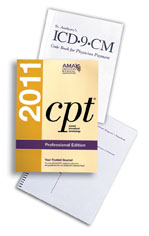Q: What is the purpose of modifiers added to the Current Procedural Terminology codes?
A: Modifiers on claims provide additional information about the service or procedure performed. They are used as an extension to alter a CPT code but not change the code or its definition. Modifiers create various reimbursement consequences for the associated visit, test or procedure.
Using these modifiers is extremely important. The proper use of modifiers improves the handling of claims at the payer's office. Modifier errors are common. They may cause claims to be denied or improperly reimbursed. Some modifiers, when used to excess, may be a "red flag" to payers and prompt a review. Some of the red flags that attract unwanted attention by payers include:
• 24: Unrelated evaluation and management services by the same physician during a postoperative period;
• 25: Significant, separately identifiable evaluation and management service by the same physician on the same day of a procedure;
• 59: Distinct procedural service;
• 54/55: Surgical care only/postoperative care only;
• GA: Signed Advance Beneficiary Notice of Noncoverage (ABN) on file.
Q: What does "unrelated" mean in the context of Modifier 24 usage?
A: "Unrelated" means that the problem or condition reported by the patient or identified by the surgeon is not connected with the surgery in any way. It is not a complication of the procedure or associated follow-up care. Commonly, "unrelated" refers to the unoperated eye. It might also refer to another anatomical part of the operated eye that is irrelevant to the surgery.
Keep in mind that diagnostic tests, including diagnostic radiological procedures, are not included in the global surgery package. For example, Modifier 24 would not be used with A-scan biometry in a global period.
Q:What types of procedures or services require the use of Modifier 25?
A: Append Modifier 25 to an exam (992xx or 920xx) when a separately identifiable service has been performed on the same day as a minor procedure. Medicare defines minor procedures as those with zero to 10 days of postoperative care. Examples include foreign body removal (65222), laser trabeculoplasty (65855), punctal occlusion with plugs (68761), epilation for correction of trichiasis (67820) and intravitreal injections (67028).

There is no need to have more than one diagnosis on the claim to use Modifier 25. The CPT definition specifically states, "… different diagnoses are not required for reporting of the E/M services on the same date." If the patient does have more than one problem being addressed at the visit, it is appropriate to use different diagnoses on the claim.
When the only purpose of the exam is preoperative care, then a claim for an office visit with Modifier 25 would not be appropriate. For example, your established patient presents today complaining of something poking her in the right eye. Your exam reveals an errant eyelash turning in on the right lower lid. You epilate the lash. The exam today would be considered preoperative care and included in the reimbursement for the epilation. Epilation is the only billable service.
Q: When is Modifier 59 used? What about Modifier GA?
A: When a procedure or service includes two or more CPT codes bundled in Medicare's National Correct Coding Initiative (NCCI) edits, yet circumstances support separate charges.
According to the Centers for Medicare & Medicaid Services (MedLearn Matters No. SE0715), "Use of Modifier 59 ... does not require a different diagnosis for each HCPCS/CPT code procedure/surgery. Additionally, different diagnoses are not adequate criteria for use of Modifier 59. The codes remain bundled unless the procedures/surgeries are performed at different anatomic sites or separate patient encounters."
Q: Are Modifiers 54 and 55 recognized by all payers?
A: Many commercial payers do not recognize Modifiers 54 and 55. Therefore, patients with commercial insurance are often followed by the surgeon for postoperative care during the global period and released to the referring optometrist for their eye-care needs.
For filing, the Medicare Claims Processing Manual, Chapter 12, Section 40.2.A.3, provides instructions on claim format as follows: "Both the bill for the surgical care only and the bill for the postoperative care only, will contain the same date of service and the same surgical procedure code, with the services distinguished by the use of the appropriate modifier. Providers need not specify on the claim that care has been transferred. However, the date on which care was relinquished or assumed, as applicable, must be shown on the claim. This should be indicated in the remarks field/free text segment on the claim form/format."
Modifier GA indicates that you have a signed ABN for the specific service provided. An ABN serves as a written notice given to a Medicare beneficiary when you believe that Medicare probably or certainly will not pay for some or all of the items or services.
Q: Can modifiers required for office visits be added to evaluation/management codes (992xx) and ophthalmology codes (920xx)?
A: Yes. An evaluation and management (E/M) service (992xx) may be reported using modifiers for office visits (i.e., Modifiers 24, 25, 57). Likewise, these modifiers may be applied to an office visit reported with an eye exam code (920xx).
Comparative data exists showing how often these modifiers are used. The Part B Extract and Summary System data from 2008 indicates that for every 100 exams filed to Medicare Part B, Modifier 24 was used 2 percent of the time, Modifier 25 was used 9 percent, Modifier 54 was used 2 percent and Modifier 59 was also used 2 percent.
There's no need to worry if modifier usage exceeds what is considered normal practice patterns. As with all discussions associated with utilization data, practice patterns that do not comport to normative data do not necessarily mean erroneous claims. However, aberrant patterns should cause you to review the use of modifiers to ensure compliance.
Ms. McCune is vice president of the Corcoran Consulting Group. Contact her at DMcCune@corcoranccg.com.



